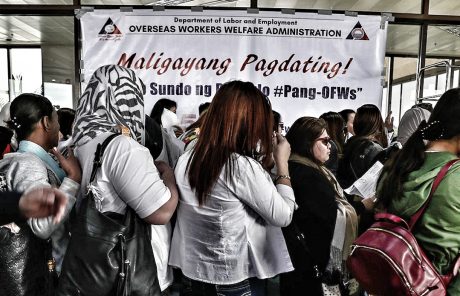
Back in the old days before social media there was a particularly “viral” email going around that enjoined humanity to “imagine a world without Overseas Filipino Workers”. The author of the email went on the wax poetic about such a world where there’d be catastrophic shortages in nurses, elderly care, welders, and all sorts of other professions and services that the First World “depend on” for their prosperity.
I found the author’s presumption of the First World’s “dependence” on OFW labour quite astounding. We are made to believe by this obscure author that Filipinos are the source of First World wealth. The facts, however, say otherwise. It is the other way around. Filipinos are pathetically dependent on First World employment. What Filipinos who swallowed the drivel of this old “viral” email hook line and sinker fail to understand is that the First World, over centuries, accumulated and created the capital that accounts for their wealth. And it is this vast capital base now baked into their national economies at work for them that employs Filipinos.
Seen in this bigger context, the Kuwait “diplomatic crisis” that the Philippine government is currently embroiled in is a debatable “disaster” that, in actual fact, has long been waiting to happen. The incident reveals Filipinos’ long-recognised inability to do things by the book. At stake are tens of thousands of undocumented Filipino workers in the affluent Arab state. And in the spotlight is an illegal rescue operation that the Philippines’ diplomatic outpost over there may have been undertaking for years. An illegal activity that serves illegal workers: That’s just two layers of behaviour that falls outside of Kuwaiti law. It is quite understandable that the Kuwaitis are fuming.
It is interesting too the multiple layers of desperation highlighted in this latest circus — the desperation evident in the lengths Filipinos would go to for employment overseas and the the lengths their own government personnel would go to to rescuethem from that employment.
Two layers of desperation; plus,
Two layers of unlawful activity;
Equals:
Four layers of national dysfunction.
In short, there is a bigger cause-and-effect system happening way above the level of discourse within which the Kuwait diplomatic crisis is being “debated” by the Philippines’ foremost “thought leaders”. The national thinking’s got it all wrong. OFWs aren’t heroes. They are liabilities. Their enormous numbers expose the Philippines to the sorts of diplomatic risks that disproportionately set the agenda for the Philippines’ beggared foreign policy. In the middle of pracitcally every transaction or negotiation the Philippine government enters into with a foreign government is the OFW chip. It is played shrewdly by most foreign governments that deal with the Philippine government and it is a chip most feared by the average Filipino foreign mission or delegation.
If shabu and basketball are the opiates of the average Filipino, foreign employment is the opiate of their national economy. Like the convesations about jeepneys, environmental disasters, and drugs, the bigger conversation that needs to be had following this recent Kuwait diplomatic brouhaha is the issue of the Philippine economy’s serious OFW addiction. Perhaps this is an addiction worth waging a war against. Perhaps President Rodrigo Duterte is the man to lead such a war.
No comments:
Post a Comment